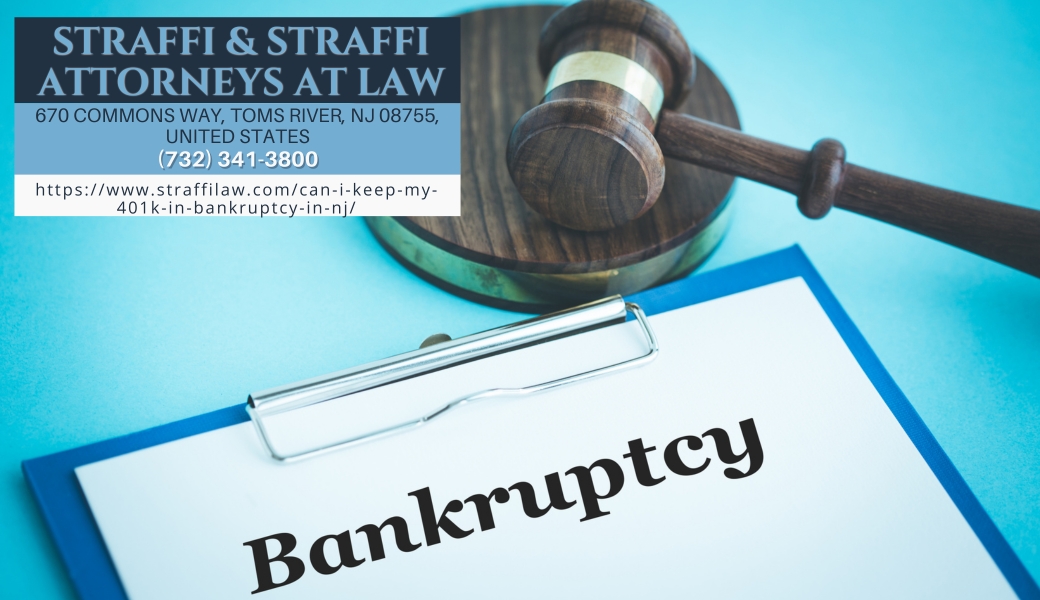New Jersey bankruptcy attorney Daniel Straffi (https://www.straffilaw.com/can-i-keep-my-401k-in-bankruptcy-in-nj/) of Straffi & Straffi Attorneys at Law provides essential information for individuals concerned about preserving retirement funds during bankruptcy. The detailed explanation focuses on how federal and New Jersey laws impact the protection of 401(k)s, IRAs, pensions, and other retirement accounts for those filing in the state. Many people fear losing retirement savings during bankruptcy, but legal safeguards allow for significant protection.
Understanding how retirement savings are treated in bankruptcy is vital, and New Jersey bankruptcy attorney Daniel Straffi outlines the legal structure that shields most retirement funds. Federal laws, including the Employee Retirement Income Security Act (ERISA) and the Bankruptcy Abuse Prevention and Consumer Protection Act (BAPCPA), play central roles in safeguarding 401(k)s and IRAs. According to Daniel Straffi, these rules were designed “to ensure that bankruptcy gives you a fresh financial start without sacrificing your long-term security.”
For New Jersey residents facing financial hardship, guidance from a New Jersey bankruptcy attorney such as Daniel Straffi is critical to making informed choices. The article explains that ERISA-protected plans—such as 401(k)s, pensions, and 403(b)s—are excluded from bankruptcy estate property, meaning trustees cannot access those funds. IRAs, while also protected, are subject to a monetary cap of $1,711,975 per person as of April 1, 2025. This limit includes both traditional and Roth IRAs, and is adjusted every three years to reflect the cost of living.
The protection of retirement accounts depends heavily on account type. New Jersey bankruptcy attorney Daniel Straffi details how 401(k)s and similar employer-sponsored accounts receive full protection under ERISA. Traditional and Roth IRAs, by contrast, fall under BAPCPA rules, which set specific limits on how much can be shielded. SEP and SIMPLE IRAs are treated as ERISA plans and thus receive full protection, while rollover IRAs retain their original protection status if funds were transferred from an ERISA plan.
New Jersey law provides additional support for individuals facing bankruptcy. As an “opt-out” state, New Jersey requires filers to choose either the federal or the state exemption system in full. Daniel Straffi emphasizes the importance of this decision, noting that “the better choice depends on your personal situation.” The New Jersey exemption system may offer advantages in certain cases, particularly for public employees with pensions.
Inherited IRAs are another area where New Jersey law differs significantly from federal law. Daniel Straffi explains how the 2015 Andolino decision allows inherited IRAs to be protected under state statute, even though federal law does not provide this exemption. This interpretation can preserve substantial assets that might otherwise be lost in bankruptcy cases outside New Jersey.
The article warns about critical mistakes that can compromise protected retirement funds. Withdrawing money from a 401(k) or IRA before filing for bankruptcy removes that money’s protected status, making it accessible to creditors. Similarly, making large contributions or loan repayments prior to filing may be viewed by the court as attempts to conceal assets. Daniel Straffi stresses that such actions can result in loss of both savings and financial security.
Bankruptcy chapter selection also affects retirement planning. In Chapter 7 cases, retirement account balances remain protected, but income from pensions or IRA distributions must be disclosed and can impact eligibility through the means test. In Chapter 13 filings, retirement funds remain shielded, but monthly contributions to retirement plans may need to be paused during the repayment plan. Daniel Straffi notes that loan repayments to 401(k)s are generally not treated as necessary expenses in Chapter 13, potentially affecting the distribution to creditors.
Retirement accounts such as 401(k)s, IRAs, and pensions are largely protected in bankruptcy proceedings, but mistakes and missteps can leave assets vulnerable. For New Jersey residents, accurate knowledge of both federal and state rules is essential. The article by Daniel Straffi offers valuable insights into how to protect long-term savings while navigating financial recovery.
Clear legal guidance can help prevent errors that lead to unnecessary loss of protected retirement assets. Speaking with a New Jersey bankruptcy attorney like Daniel Straffi before filing can ensure retirement savings remain intact through the process. Laws exist to support those seeking financial relief, and knowing how to apply them correctly is the first step in maintaining long-term financial stability.
About Straffi & Straffi Attorneys at Law:
Straffi & Straffi Attorneys at Law is a New Jersey-based law firm with a focus on bankruptcy matters. Led by New Jersey bankruptcy attorneys Daniel Straffi, Jr. and Daniel Straffi, Sr., the firm handles Chapter 7, Chapter 13, and Chapter 11 cases. The firm is committed to helping individuals and businesses protect their financial interests through clear, informed legal strategies.
Embeds:
Youtube Video: https://www.youtube.com/watch?v=8W1pJt9O848
GMB: https://www.google.com/maps?cid=18340758732161592314
Email and website
Email: familyclient@straffilaw.com
Website: https://www.straffilaw.com/
Media Contact
Company Name: Straffi & Straffi Attorneys at Law
Contact Person: Daniel Straffi
Email: Send Email
Phone: (732) 341-3800
Address:670 Commons Way
City: Toms River
State: New Jersey 08755
Country: United States
Website: https://www.straffilaw.com/





